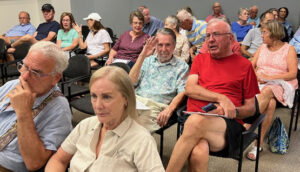
Elevations of Cornelius Commerce Center
ANALYSIS | By Dave Vieser
Aug. 15. From a reporter’s point of view Monday July 17 was one of the more interesting nights at Town Hall in years. A rezoning application for a commercial project on Bailey Road was withdrawn by applicant Drew Thigpen of Greenway Gibbons Properties to the loud applause of nearly 80 attendees.
How decisions were reached that night and what may come next is a lesson in local politics and government.
Setting the stage at Town Hall

Thigpen
At first it seemed like a slam dunk. Thigpen had asked the town if they would defer consideration of the rezoning for their project on the Town Board’s July 17 calendar and send it back to the planning board. The Planning Board had initially recommended denial of the project, but Thigpen said he had some new information he would like to provide to them. Indeed the official agenda for the July 17 meeting reflected that request. Meanwhile the meeting room at Town Hall was filled with residents opposed to the project. They were taking no chances that their concerns would not be heard before any decisions were made.
Commissioners raise concerns
The first sign that it might not be a quick meeting came when Commissioner Todd Sansbury asked what the board’s options were.
Deputy Town Manager Wayne Herron said the board had several options: approve the request to defer the project back to the Planning Board; deny the request and conduct a public hearing; after closing the hearing, if they wish, they could then render a decision for or against the rezoning application.
Commissioner Colin Furcht favored the deferral. “I understand the concerns of the citizens in our audience but I think we should listen to what new information the applicant has.” Commissioner Denis Bilodeau took an opposite approach. “As I’ve been saying for months, this project is just not a good fit at that location.”
That left Commissioner Osborne, and he sided with Furcht for deferral. With Commissioner Gilroy absent there was a rare tie at Town Board, leaving the Mayor, who normally doesn’t vote, to break the tie.
He did so very quickly, voting to deny the deferral. With that vote, the public hearing was called.
Was the applicant prepared for the hearing
If body language counts, it appears that Thigpen was not expecting that the hearing would be called that evening. He huddled with attorney Susan Irvin and they surmised, probably quite correctly, that the no votes for deferral meant that the project would go down to defeat if the hearing was held that evening, so they opted to withdraw the application.

Audience at the July 17 town board meeting on Cornelius Commerce Center
Residents came well prepared
The coordination of comments among the many residents who spoke was very obvious from the start. “This group did its homework and took the time to research the complicated rules and requirements of land use planning, traffic planning and zoning requirements,” said Bailey’s Glen resident Paul Herbert. “The time we live, work and play here is complicated by overburdened roads that delay us but, in this case, the project presented real safety hazards for children at the adjacent schools, nearby residences, the five large neighborhoods and park users at Bailey Road Park.”
They managed their allotted four minutes per speaker well, and gained the full attention of the commissioners throughout the 90 minute public session
Was the applicant hurt by a small Planning Board turnout in June?
While the Planning Board vote is only a recommendation, it can carry significant weight with the Town Board. The well publicized matter had been heard by the Planning Board at their June 12 meeting and while a significant number of residents were in attendance, board turnout was poor. There are nine members on the board, but only five were in attendance, barely a quorum.
Members Fred Westaway, Phil Belchtold, George Searle and Jamie Rauscher were absent. The final vote was 3-2 for denial. Would it have been different if more members were present?
We will never know for sure, but it’s certainly a possibility.
What happens now?
The application has been officially withdrawn. If Thigpen feels he has a shot at a future approval, he has the right to resubmit. Of course, the matter would have to go through the entire hearing process all over again, which could take 3-4 months.
Or he might want to hold for now, and resubmit after a new Town Board is constituted in December. Other options would be to modify the project and/or find a different location. Many residents and some commissioners had more issues with the location than the project itself.
What about the property owner?
Oftentimes forgotten in a situation such as this is the property owner. In a letter published in Cornelius Today, Eugene Hunter stated that his family had farmed the land for centuries, but that they were ready to move on and hoped that the town would give them the same consideration they had given others for decades as the town grew from a sleepy farm community to bustling suburb.
Hunter is still waiting.




